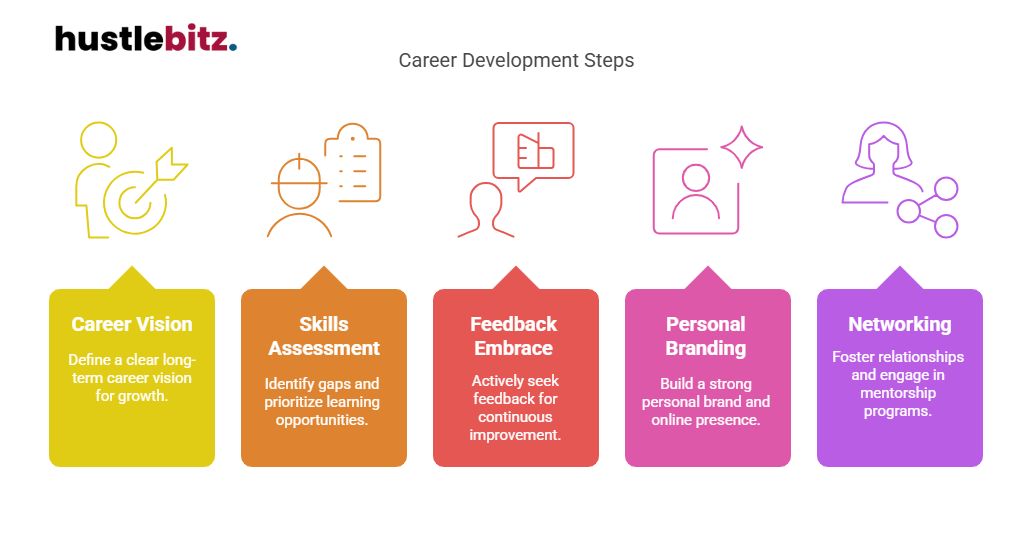Achieving career development success requires a strategic approach focused on several key steps. Start by clarifying your long-term career vision, ensuring it aligns with personal goals and market trends. Navigate your skills landscape by identifying gaps and pursuing relevant training opportunities. Set SMART short- and long-term goals, maintaining a balance between work and personal life. Embrace constructive feedback to foster continuous improvement and adaptability in your professional journey. Finally, communicate your unique value effectively through personal branding and networking. There are many more insights to consider as you pursue your career aspirations.
Key Takeaways
- Define a clear long-term career vision to guide your professional growth and align short- and long-term goals.
- Conduct skills assessments to identify gaps and prioritize learning opportunities that match industry trends.
- Actively seek and embrace feedback to refine skills and adapt to new challenges for continuous improvement.
- Build a strong personal brand and optimize your online presence to effectively communicate your unique value.
- Foster networking relationships and engage in mentorship programs for guidance and support throughout your career journey.

Clarify Your Long-Term Career Vision

To effectively navigate your career path, it is essential to clearly define your long-term career vision, as this serves as a guiding framework for your professional growth and decision-making. A well-articulated vision statement aligns your career aspirations with actionable goals, allowing you to focus your efforts on future planning. By envisioning the career you desire, you can also enhance your personal branding, making it easier to communicate your unique value in a competitive job market.
In establishing your vision, consider current industry trends that may influence your career trajectory. This awareness will enable you to adapt your vision to the evolving landscape and identify relevant passion projects that enhance your skill set. Utilizing self-assessment tools can further clarify your strengths and interests, guiding your strategic choices.
Moreover, effective networking strategies are critical in realizing your long-term vision. Building relationships with industry professionals can open doors to mentorship opportunities, providing invaluable insights and support as you progress.
Striking a balance between work and life is also essential; a well-rounded approach fosters resilience and adaptability in achieving your career aspirations.
Identify Skills Gaps for Improvement

Identifying skills gaps is a crucial step in the career development process, as it enables individuals to pinpoint areas for improvement and strategically align their learning efforts with their long-term career goals. Conducting a comprehensive skills assessment is the first action to take, allowing for a clear understanding of existing competencies versus required skills. Utilizing performance reviews and peer comparison can provide insights into one’s current standing and highlight specific areas needing attention.
Once gaps are identified, it is essential to explore various training opportunities. Online courses and workshops can facilitate personal development, ensuring that individuals acquire the skills necessary for advancement. Additionally, mentorship programs can offer invaluable guidance, tailored advice, and support as individuals address their skills gaps.
Self-reflection exercises can also play a vital role in this process. By evaluating past experiences and feedback, individuals can develop a deeper awareness of their strengths and weaknesses. Keeping abreast of industry trends is equally important, as it informs individuals about the skills that are in demand, enabling them to prioritize their learning efforts effectively.
Networking strategies can enhance the process of identifying skills gaps by connecting individuals with professionals in their field. Engaging in discussions about challenges and required skills can yield insights and foster collaborative learning opportunities.
Ultimately, addressing skills gaps is not merely an exercise in self-improvement; it is a strategic approach to career advancement that ensures individuals remain competitive and relevant in a rapidly changing job market.
Design a Roadmap for Career Progress

A well-structured roadmap for career progress serves as a strategic guide, outlining specific goals and the necessary steps to achieve them.
To effectively design this roadmap, individuals should start with self-assessment tools to evaluate their current skills and identify areas for improvement. Understanding industry trends is crucial for setting relevant, achievable goals that align with the evolving market landscape.
Incorporating personal branding into the roadmap enhances visibility and demonstrates professionalism. This can be achieved by refining online profiles, participating in discussions, and sharing insights relevant to one’s field.
Networking strategies, including attending industry events and engaging with peers, can open doors to mentorship opportunities that provide invaluable guidance and support.
Professional certifications are another vital component; they not only validate expertise but also enhance credibility in the job market. Time management plays a key role in balancing career development activities with current responsibilities, ensuring that individuals remain focused and productive.
Moreover, emotional intelligence and resilience building are essential traits that help individuals navigate challenges and adapt to setbacks. Engaging in job shadowing experiences offers practical insights into different roles, further informing career decisions.
Maximize Learning

Building on the foundation of a structured career roadmap, maximizing learning opportunities is vital for continuous professional growth and adaptation in an ever-changing job market. By actively seeking mentorship opportunities, professionals can gain invaluable insights from experienced individuals who can guide them through complex career challenges.
Online courses present a flexible way to acquire new skills, allowing learners to stay current with industry trends and enhance their marketability. Participating in skill workshops further equips professionals with hands-on experience, fostering experiential learning that is often more impactful than traditional classroom settings.
Utilizing self-assessment tools enables individuals to identify strengths and areas for improvement, guiding their learning journey effectively. Networking strategies play a crucial role in broadening one’s horizons, enabling professionals to connect with peers and industry leaders who can share knowledge and resources.
Engaging in peer collaboration not only enhances learning but also creates a support system that encourages continuous improvement. Additionally, obtaining professional certifications can validate skills and signify commitment to personal development, enhancing one’s credibility within the industry.
Staying informed about industry trends is essential for maintaining relevance in today’s dynamic marketplace. By integrating these learning opportunities into their career development strategies, professionals can cultivate a culture of lifelong learning that ultimately leads to greater success and fulfillment in their careers.
Emphasizing a proactive approach to maximizing learning ensures that individuals remain competitive and prepared for the challenges that lie ahead.
Set Short- and Long-Term Career Goals
How can professionals effectively set short- and long-term career goals to ensure sustained growth and direction in their careers?
The foundation of successful career development lies in strategic goal-setting techniques. Professionals should start by conducting a self-assessment using various self-assessment tools to identify their strengths, weaknesses, and interests. This clarity enables them to define specific, measurable, achievable, relevant, and time-bound (SMART) goals that align with their career aspirations.
Incorporating personal branding into goal setting is essential, as it helps individuals communicate their unique value propositions. This, paired with effective networking strategies, can open doors to mentorship opportunities that provide invaluable guidance and insights. Mentors can assist in navigating industry trends and suggest pathways for career pivoting when necessary.
Maintaining work-life balance while pursuing career goals is critical for long-term success. Professionals must evaluate their performance metrics regularly to track progress and realign their goals as needed. Using motivation methods such as setting smaller milestones can help sustain enthusiasm and commitment.
Embrace Feedback and Adapt

Embracing feedback is crucial for professionals aiming to refine their skills and adapt to the evolving demands of their careers. By actively engaging in feedback loops, individuals can gain insights that drive personal and professional growth. Constructive criticism, when approached with an adaptability mindset, can illuminate areas for improvement and enhance overall performance.
Peer reviews are a potent tool in this process, fostering an environment of open communication that encourages candid discussions about strengths and weaknesses. Establishing mentorship relationships can further support this journey, as mentors offer valuable perspectives and guidance on navigating challenges. Regular performance evaluations serve as checkpoints, allowing professionals to assess their progress and recalibrate their goals.
Incorporating self-reflection practices is paramount to understanding how feedback influences one’s development. By taking time to analyze feedback, professionals can identify patterns and set actionable steps for improvement. This reflective approach promotes a growth mindset, where challenges are viewed as opportunities for learning rather than obstacles.
Moreover, resilience training can enhance an individual’s ability to respond to criticism and setbacks. Cultivating resilience enables professionals to bounce back from adverse feedback and maintain motivation in their career paths.
Ultimately, embracing feedback is not merely about receiving it but also about integrating it into one’s professional journey. By fostering a culture of adaptability and continuous improvement, individuals can position themselves for long-term career success.
Communicate Your Value
Effectively communicating your value in the workplace is essential for career advancement and establishing a strong professional reputation. To achieve this, individuals must develop a strong personal branding strategy that encapsulates their unique skills and experiences. Crafting a compelling elevator pitch is crucial; this concise narrative should clearly articulate your value proposition, highlighting what makes you an asset to potential employers or collaborators.
Furthermore, leveraging networking strategies can enhance your professional relationships, allowing you to connect with mentors who can provide guidance and support. An optimized online presence, particularly on professional platforms like LinkedIn, plays an important role in how others perceive your professional image. This includes sharing relevant content and engaging with your network to showcase your expertise.
The table below illustrates key components to consider when communicating your value:
| Component | Description | Importance |
| Resume Optimization | Tailor your resume to highlight relevant skills | Ensures you stand out in applicant tracking systems |
| Interview Techniques | Practice articulating your value proposition | Enhances your confidence and ability to persuade |
| Self Advocacy Skills | Learn to speak up about your accomplishments | Fosters recognition and opportunities for growth |
Final Thoughts
Achieving career development success requires a combination of clear goal-setting, continuous learning, and adaptability. By strategically aligning your long-term vision with short-term actions, assessing and addressing skills gaps, and embracing feedback, you can continuously improve and stay competitive in your field. Personal branding and effective communication of your unique value are also crucial for standing out. Ultimately, staying proactive and open to learning will help you navigate challenges and seize new opportunities, ensuring a fulfilling and successful career journey.




